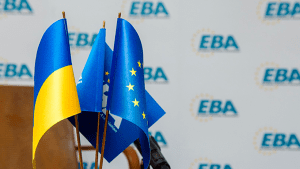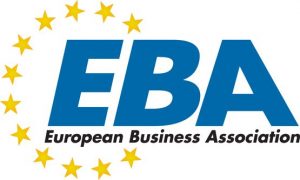
Business awaits law enforcement reforms, but the latest version of the law on the Economic Security Bureau and the bill on the reform of the Security Service (SBU) adopted at first reading raise doubts about the quality of such reforms, the European Business Association (EBA) said in a release.
“It is worth noting that currently, the problem of cooperation with law enforcement agencies concerns not only SMEs and regional entrepreneurs but also large international companies and strategic investors,” the release says.
“The reform issue is especially relevant now in the context of the establishment of the Bureau of Economic Security. Although the community has not yet seen the final version of the document, the business was wary of the penultimate version of the draft law. Thus, there are fears that instead of a radically new analytical body that would help protect the interests of business, a new structure may be created with a new name, but with the same methods of work and even the same people,” the EBA says.
“At the same time, the SBU reform was launched, so to speak, by the adoption of the draft law No. 3196-d at first reading. Thus, the draft law was supposed to eliminate anti-corruption and economic units in the SBU, partially demilitarize the service, etc. However, there are fears that the liquidated SBU departments will be reincarnated as other functional units that will provide counterintelligence support in the economic context. In other words, it is likely to put continued pressure on the business. And, in general, this document invokes a lot of questions concerning the renewed functions and powers of the service,” it noted.
“Therefore, the European Business Association appeals to Volodymyr Zelensky, President of Ukraine, Denys Shmyhal, Prime Minister of Ukraine, and Arsen Avakov, Minister of Internal Affairs, to pay due attention to reforming the law enforcement system in 2021. It is unacceptable and unreasonable to persecute the business. Otherwise, the issue of attracting investment, business development, and economic development, in general, may become a big question. We hope that the time for fundamental reforms has come and we will finally move from talks to the action!” the document says.

A number of European Business Association (EBA) member companies, which “have Chinese roots,” are concerned about the imposition of sanctions by Ukraine against the Chinese shareholders of PJSC Motor Sich and will temporarily refrain from investing, EBA Executive Director Anna Derevyanko has said.
Chinese investors have temporarily put on hold all the issues related to investing in the country, she said at a meeting of the Global Economic Review of Ukraine association, when its participants raised the issue of these sanctions and their possible consequences for trade and economic relations with China.
According to Andriy Horokhov, the director general of UMG Investments, in 2020 Ukraine was lucky with the conjuncture in agriculture and metallurgy, and a large part of the products of these industries went to China. He added that the Chinese market is also expected to grow in 2021.
“I understand for sure that you have to be more careful with a trading partner with a turnover of about $ 10 billion,” he said.
“If suddenly we make mistakes in this direction, then we will need to understand where we will compensate for our sales markets, given the situation in Europe and the United States and the uncertainty with the pandemic. I hope there will be wise and balanced decisions here, and people will professionally approach this issue,” he said.

The European Business Association (EBA) has addressed Prime Minister of Ukraine Denys Shmyhal with a request to resume the work of the system of state registration of pesticides and agrochemicals, which was suspended in late May 2020, according to a statement posted on the association’s website on Tuesday.
According to the member companies of the EBA Agrochemical Committee, the problems have become relevant since the renaming of the Ministry of Energy and Environmental Protection of Ukraine and the establishment of the Ministry of Environmental Protection and Natural Resources.
“At the end of May, the Scientific Expert Council at the Ministry recommended 100 chemical products as a result of the meeting. However, as of today, the Ministry of Environmental Protection and Natural Resources has not yet made a decision on their registration. Therefore, the abovementioned chemical products are not included in the State Register of pesticides and agrochemicals approved for use in Ukraine,” the EBA said.
The association also noted that if chemicals are not included in the State Register, Ukrainian and international importers and manufacturers of plant protection products will not be able to provide farmers timely with a significant number of next-generation products.
“Due to this situation, legal businesses suffer losses as they fail to sell their products. As the result, the state budget lacks revenues from taxes and customs duties estimated at millions of hryvnias,” the association said.
In addition, the EBA noted that the use period of PPPs is quite short. Accordingly, the farmer will buy what is available on the market.
“Due to the lack of high-quality registered PPPs, there is a risk of a significant increase in demand for gray imports and counterfeit products. Thus, the quality and security of the future harvest, and, consequently, the export potential and currency stability of the country may be threatened,” it said.
Therefore, the business community appealed to the prime minister to pay attention to this situation and adjust the work of relevant departments, offices, and divisions of the Ministry of Environmental Protection so that to restore the system of state registration of pesticides and agrochemicals and, in general, to ensure quality conditions for doing business in the country, which is one of the tasks of the reorganized ministry.

Foreign Minister of Ukraine Dmytro Kuleba has offered President of the American Chamber of Commerce in Ukraine (ACC) Andy Hunder and Executive Director of the European Business Association (EBA) Anna Derevyanko cooperation to develop trade and attract investment, the press service of the ministry said. “In the United States, Asian countries, and EU countries, the protection of internal business abroad, the development of trade, and the attraction of investments are some of the key functions of the foreign ministries. Now we are creating such an effective system of economic diplomacy in Ukraine. I would like to invite the leading Ukrainian business to unite forces,” Kuleba said during a video conference on Tuesday.
Kuleba also told about the relaunch of the Council of Exporters and Investors under the Ministry of Foreign Affairs. A meeting of the members, 80% of whom were reelected, is scheduled for May 21. Participants will be organized according to industry principles and will develop a joint work plan for the year.
The minister also shared with Hunder and Derevyanko his vision of cooperation between the diplomatic system and business, which will fill the agenda of relations with other countries with real cooperation projects, liberalize trade, expand the geography of exports, and attract investment in Ukraine.
Kuleba believes that successful Ukrainian business is also able to play a key role in establishing an effective system of economic diplomacy. It is, in particular, about professional expert assessment, attracting business to diplomatic education, and conducting special trainings and courses.
Derevyanko and Hunder, in turn, expressed gratitude for the initiative, which, in their opinion, is able to bring cooperation between business and diplomacy to a new level and contribute to the protection of Ukrainian economic interests. For their part, they confirmed their readiness to cooperate under the Council of Exporters and Investors, as well as in the development of an assessment system and diplomatic education.The parties paid special attention to the subject of encouraging foreign companies that transfer production from other regions of the world closer to sales markets, to locating production in Ukraine.
ACC, EBA, FM, INVESTMENTS

The European Business Association (EBA) has asked Head of the Verkhovna Rada committee for transport and infrastructure Yuriy Kysyl to support a bill proposing new legislation for the taxi market, the press service of the EBA said on Friday. “The adoption of a new model for regulating the taxi market is a significant step in introducing European standards into the life of Ukrainians. We hope that the new law on taxis will allow us to remove transportation from the shadows, get rid of outdated regulations and instead introduce clear and equal rules of the game for market players. For the first time, Ukraine has approached the reform of the taxi services market in such a comprehensive and professional manner that it is undoubtedly a positive signal,” the press service said, citing Advocacy Team Leader at the EBA Igor Gotsyk.
According to the report, the bill proposes the cancellation of obtaining a license for the domestic transportation of passengers by taxi, while at the same time the obligation is introduced to notify the State Service of Ukraine for Transport Safety, which also provides the functions of the public register of road carriers.
In addition, according to the document, an individual road carrier is not required to register as private entrepreneur. He also does not need to draw up a contract on transportation for each service in paper. He can only draw up a contract in electronic form.
“Given the thoroughness of the above-mentioned provisions and the importance of their adoption in order to increase the transparency of operations by carriers who operate road passenger transport services, we expect fruitful cooperation and hope that the bill will be adopted this autumn,” the EBA said.

The European Business Association (EBA) shares the position of the office of the president regarding the introduction of a nationwide system of electronic timber accounting and stresses the need for all timber makers to join this system. “For a more efficient operation of the electronic timber accounting system, it is critically important that all timber makers are connected to it, regardless of the form of subordination,” Yevhen Kuzmenko, the manager of EBA committees, told Interfax-Ukraine.
He noted that the system shows all the data from logging to timber sale or accepting for processing: who is involved in timber logging and on the basis of what documents, the characteristics of timber, as well as to whom and at what price it was sold.
“This system has already been introduced in forestries subordinated to the State Forest Agency. But it does not apply to other forest users, such as state enterprises of the Ministry of Defense, the Ministry of Environment, municipal companies, and others. They, according to various sources, harvest from 17% to 27% of the total volume of timber,” the expert said.
According to him, this situation allows manipulating the origin of wood.